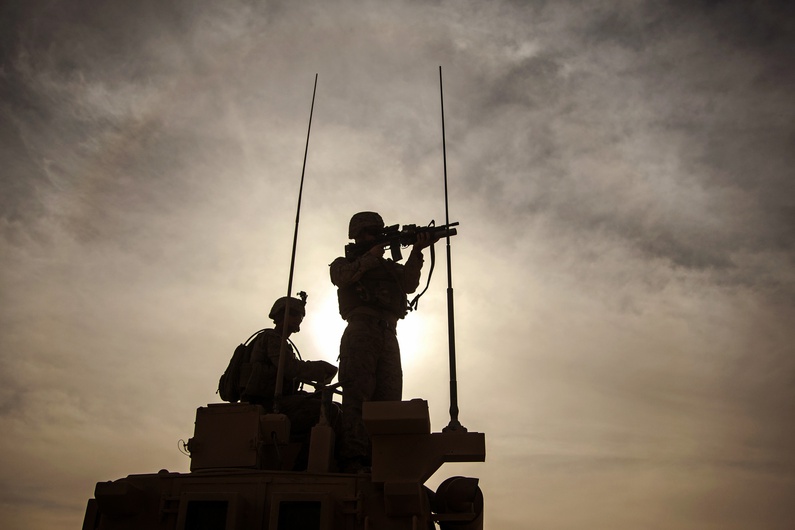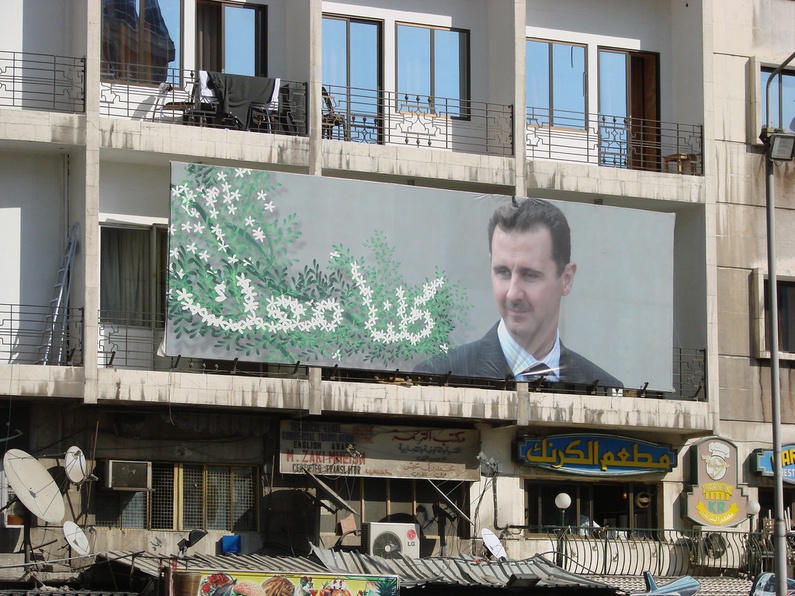
5 things you need to know to understand the rise of Daesh
Published on
Translation by:
Monica BibersonHow can we efficiently fight against Daesh? Step one: accept that this jihadist group has not come out of nowhere. In his book Le piège Daech ("The Daesh trap"), historian Pierre-Jean Luizard looks at the reasons for its success. Here are five points he makes.
Unheard of until two years ago, the Islamic State group named Daesh (or ISIS) became enemy number one in a few short months. Today, the organisation's growing number of attacks across the globe is putting increased pressure on the coalition to combat the Daesh threat. There is an ongoing debate over how to fight against it. Aerial bombing? Troops on the ground? We need to be careful.
As the historian and CNRS research director Pierre-Jean Luizard reminds us, "a military defeat of Daesh will not solve anything if the causes of its initial success are not taken into account." His book, Le piège Daech ("The Daesh trap"), published just a month after the Charlie Hebdo attack, looks at the reasons for this group's meteoric success. A year on, his analysis is more relevant than ever.
1. A success "not military in kind"
Whilst today we tend to associate Daesh with Syria, we should not forget that the jihadist group's birthplace is in Iraq, in particular in the mainly Sunni areas to the north of the country. In order to properly understand its rise, Luizard insists that we must bear in mind that "the ingredients of Daesh's initial success of are not military in kind."
 A quick look back in time is needed to properly understand this. In 2014, Daesh scored its first victories in the climate of tensions between the Sunni and Shi'ite communities of Iraq. The historian points to a brutal change in the balance of power in the wake of the American military occupation as the source of these tensions. The Shi'ite community, making up the majority of the country's population, found itself in power after having long been discriminated against under Saddam Hussein's (Sunni) regime. In turn, the Sunnis saw themselves become marginalised.
A quick look back in time is needed to properly understand this. In 2014, Daesh scored its first victories in the climate of tensions between the Sunni and Shi'ite communities of Iraq. The historian points to a brutal change in the balance of power in the wake of the American military occupation as the source of these tensions. The Shi'ite community, making up the majority of the country's population, found itself in power after having long been discriminated against under Saddam Hussein's (Sunni) regime. In turn, the Sunnis saw themselves become marginalised.
As a result, in some mainly Sunni cities such as Mosul, Tikrit or Fallujah, people felt disconnected from the Shi'ite power in Baghdad, known to be thriving on favouritism and corruption. The Iraqi army, as the government's representative on the ground, was held in contempt by the population. One can understand why: "The army used indiscriminate bombing to crack down on sit-in protests against the political marginalisation of the Sunni Arab community," writes Luizard.
2. Daesh seen as a "liberating army"
It is now easier to understand why, initially, a good part of the population welcomed Daesh's fighters. Being perfectly aware of the situation, Daesh presented itself as "protector of the Sunnis". It was a winning strategy, and the historian goes as far as to say that in Mosul, Tikrit, Fallujah and other places, the arrival of Daesh's militiamen was seen by many as the arrival of a "liberating army".
Map of the Iraqi cities of Fallujah, Mosul and Tikrit
Once they arrived, the army went even further. It presented itself as a kind of dispenser of justice which was going to right the inequalities of the past. In Mosul, for example, as Luizard explains: "militiamen publicly executed those who were deemed responsible for the corruption." As a result "products that had been the object of speculative shortages reappeared in markets, sometimes sold at half the price because they were basic foodstuffs."
In a similar vein, Daesh restored power to local actors – so long as they submitted to the jihadists' morals. It is for these reasons that in such places the majority of Arab Sunnis – "some passively, others actively" – accepted Daesh's arrival.
3. Bashar al-Assad's helping hand
Because the war is being waged at the gates of Iraq, it has been a godsend in Syria for the group's ambition to create a new transnational state in complete disregard of current international borders. It should be noted that, since 2011 when Bashar al-Assad's regime began to repress the popular uprising, the conflict has increasingly turned communities against each other. Thus, Salafist/jihadist groups such as the al-Nusra Front – a Syrian branch of al-Qaida – quickly emerged from within the ranks of the opposition. The prolongation of the conflict has precipitated the break-up of the Syrian state, enabling these groups to fill an ever-widening void.
This is without even taking into account the helping hand that came from an unexpected ally – none other than Bashar al-Assad himself. But was it so unexpected? In fact, Luizard points out that the jihadist groups had shared goals with the Syrian regime. For example: "In a deliberate attempt to weaken more secular and pacifist tendencies within the opposition, the Syrian authorities in 2011 released hundreds of Salafist/jihadist prisoners," explains the historian. "One of them, in particular, was Abu Musab al-Suri, who was seen as a new ideologue of world jihad."
 Furthermore, he adds, "the regime has been careful to bomb first and foremost the locations and units of the Free Syrian Army (FSA)", which fights for democracy. Assad's message has been clear: "either chaos, or me!" As a consequence, the territory controlled by Salafist militias has extended. Syria has been broken up into pieces.
Furthermore, he adds, "the regime has been careful to bomb first and foremost the locations and units of the Free Syrian Army (FSA)", which fights for democracy. Assad's message has been clear: "either chaos, or me!" As a consequence, the territory controlled by Salafist militias has extended. Syria has been broken up into pieces.
4. Daesh more credible than al-Qaeda
The Salafist militias are not spared rivalries and skirmishes and continue to fight amongst themselves. Having said that, "there is constant migration from one section of the al-Nusra troops and other Salafist militias towards the ranks of the Islamic State," reveals Luizard. Why? The answer is simple: Daesh brings a more credible perspective. In fact, this is the first time that a Salafist group's clearly stated goal is "to occupy a geographic area with the ambition to build a state" in which it would apply Sharia Law; a state with a leader, a real army, taxes and even its own currency.
Where money is concerned, Daesh has plenty of it. This is thanks to some private donors, of course, but also – and this is important – as a result of pursuing the logic of territorial conquest. Thus, Daesh has managed to get hold of astronomical sums on the ground. During the "robbery" of the only central bank in Mosul, for example, the war chest seized was estimated to have been as high as 313 million euros. But banknotes and gold are not the only source of Daesh's wealth – oil and American military equipment taken from the Iraqi army have also played a decisive role.
5. The use of seduction and colonial reminders
Whilst establishing itself in a given territory, Daesh ultimately seeks to transcend its Sunni/Arab/Middle Eastern character. It wants to address a world community. In order to do so, it has adopted a Universalist discourse. As Paul-Jean Luizard assures us, this conflict is not between "East and West" but between Daesh's vision of Islam and the non-believers. This takes into account the fact that in Islam "everybody is welcome, even blonde Europeans of Catholic origin, just as non-believers include both Arabs and bad Muslims."
 What better way to reach the maximum number of people than to, once again, stir the highly sensitive subject of colonial frustrations? By disregarding the borders inherited from a colonial past, Daesh makes symbolic use of certain historic elements to its own advantage. As Paul-Jean Luizard explains, Daesh "touch on a theme which 'speaks' to people in countries such as France, Great Britain or the United States. By presenting Muslims as eternal victims of a dominant non-believing West, it crystallises a diffuse feeling of injustice held by some young people."
What better way to reach the maximum number of people than to, once again, stir the highly sensitive subject of colonial frustrations? By disregarding the borders inherited from a colonial past, Daesh makes symbolic use of certain historic elements to its own advantage. As Paul-Jean Luizard explains, Daesh "touch on a theme which 'speaks' to people in countries such as France, Great Britain or the United States. By presenting Muslims as eternal victims of a dominant non-believing West, it crystallises a diffuse feeling of injustice held by some young people."
"Not falling into the trap"
Today we know the horror of Daesh. There is no doubt about that. But, as Luizard warns, the important thing is not to fall into its "trap". A year ago, when his book was published, the historian was concerned about the fact that, strictly speaking, the coalition against Daesh had "no political perspective to offer to the people who have joined [the jihadi group]". We are forced to admit that the situation has hardly changed today.
Yet we know that, with or without a military victory, a long-term peace solution is unthinkable if the roots of the rise of Daesh are not taken into account. As Luizard wonders: "When [the French Foreign Minister] Laurent Fabius speaks of helping the government of Baghdad to re-establish its sovereignty, does he realise that this is certainly the very last thing that the inhabitants of Mosul, Tikrit and Fallujah want?"
The same thing can be said on the subject of Bashar al-Assad, the famous "lesser evil" that is starting to become more palatable than the "greater" one. In this new war against terrorism it is essential, according to Luizard, not to forget that "in reality, Daesh derives its strength only from its adversaries' weakness."
---
Read: Le Piège Daech by Pierre-Jean Luizard (published by La Découverte, 2015)
Translated from 5 choses à savoir pour comprendre l’ascension de Daech



